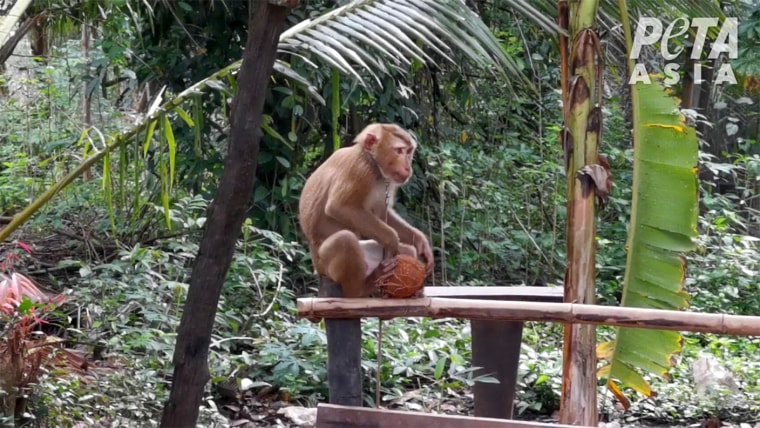Target has joined several other retailers in dropping a Thailand-based company’s coconut products following allegations that its farms use monkey labor.
Target will no longer carry Chaokoh coconut products in its stores amid allegations that its manufacturer has continued to use monkey labor at its coconut farms in Thailand, Target confirmed to NBC News Tuesday. The retailer said it pulled the product from its shelves last year, but the People for the Ethical Treatment of Animals recently publicized the decision.
“We believe in the humane treatment of animals and expect those who do business with us to do the same,” Target said. “We take seriously the claims made against Chaokoh, and given they were unable to sufficiently address the concerns raised, we made the decision to remove their product from our assortment in November 2020.”

PETA alleged last year that its investigators found young monkeys were chained and trained to pick coconuts at multiple farms in the South Asian country, including farms used to produce Chaokoh coconut milk and water. Investigators found conditions unchanged more than a year later on subsequent visits, PETA said in an update earlier this month, in which it announced that Target had dropped the brand.
“The terrified young monkeys are forced to perform frustrating and difficult tasks, such as twisting heavy coconuts until they fall off the trees from a great height,” PETA alleged on its website. “An investigator learned that if monkeys try to defend themselves, their canine teeth may be pulled.”
Multiple retailers dropped Chaokoh coconut products last year, including Costco, Walgreens, Food Lion, Giant Food and Stop & Shop, NBC's "Today" reported in October. Monkey labor is not uncommon in Thailand, Kent Stein, corporate responsibility officer for PETA, told “Today” last year.
“We work with Thai animal groups who have told us they also fight against it," he said. "They don't want to see the monkeys abused this way. It's just an old-world, unfortunate cruelty."
Theppadungporn Coconut Co. Ltd, which manufacturers Chaokoh, did not immediately respond to a request for comment from NBC News. Chaokoh posted a statement to its Twitter account last year denying the use of monkey labor at its farms.
“In light of the disturbing reports in the news, we'd like to make it clear that both we and our associated parties do not support the use of monkey labour in the harvesting of coconuts,” the company’s tweet said.
Chaokoh said that all of its suppliers have signed a pledge to not use monkey labor and ensure that they comply with audits by the Thailand Ministry of Agriculture.